For-Profit Colleges Sue Obama Administration Over New 'Gainful Employment' Regulations

The federal government and a group of private colleges were battling this week over new rules aimed at keeping students out of extreme debt after graduation. The Association of Private Sector Colleges and Universities filed suit against the Obama administration Thursday, alleging that the regulations could lead to less federal aid for career preparation programs and in turn limit access to education.
The U.S. Education Department announced last week that career training programs must show their graduates were gainfully employed, or making enough money after graduation to pay off their student loans. If not, they could lose federal funding -- a potentially devastating blow to for-profit colleges, many of which get up to 90 percent of their revenue from federal student aid. About 1,400 programs with 840,000 students were at risk of not passing and being penalized.
Under the new rules, former students' salaries would be monitored and compared with how much debt they have, The Hill reported. Education Secretary Arne Duncan said the rules were intended to keep career colleges accessible to the middle class. "These regulations are a necessary step to ensure that colleges accepting federal funds protect students, cut costs and improve outcomes," he said. The new rules were to go into effect in July 2015.
The association of for-profit colleges disagreed. It called the rule "unlawful, arbitrary and irrational" because there were too many factors schools couldn't control, like students' personal preferences and conditions of the job market, the Associated Press reported. The results could also be skewed because students typically don't make much money right after they graduate. “This regulation, and the impact it will have on student access and opportunity, is so unacceptable and in violation of federal law that we were left with no choice but to file suit,” the association's president, Steve Gunderson, said in a statement.
For-profit colleges eager for federal funds have skirted the rules before. In 2007, Corinthian Colleges Inc. paid $6.5 million to settle a lawsuit alleging the company recruited students by exaggerating the numbers of people who got jobs after graduation and inflating their salaries. Last year, a Huffington Post investigation found Corinthian-owned Everest College had been paying contractors to hire their graduates for short periods in an effort to improve its job placement rates. Recruiters also targeted prisoners who later found out their criminal records legally prevented them from doing the jobs they trained for, BuzzFeed reported. Corinthian remained under investigation as of August.
As of last spring, about 1.3 million people were enrolled in for-profit colleges such as DeVry University, the University of Phoenix, Full Sail University, Le Cordon Bleu and ITT Technical Institute. Under the new regulations, students’ yearly loan payments can't surpass 20 percent of their discretionary income or 8 percent of their total earnings.
© Copyright IBTimes 2024. All rights reserved.












